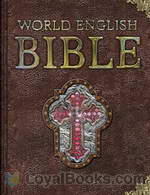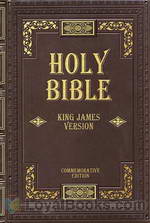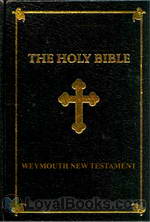|
Books Should Be Free Loyal Books Free Public Domain Audiobooks & eBook Downloads |
|
|
Books Should Be Free Loyal Books Free Public Domain Audiobooks & eBook Downloads |
|
Non-fiction |
|---|
Book type:
Sort by:
View by:
|
By: Unknown | |
|---|---|
 World English Bible (WEB) - Matthew
World English Bible (WEB) - Matthew
The World English Bible (also known as WEB) is a public domain translation of the Bible that is currently in draft form. Work on the World English Bible began in 1997 and was known as the American Standard Version 1997. The New Testament is considered complete and is available in print.The World English Bible project was started to produce a modern English Bible version that is not copyrighted, does not use archaic English (such as the KJV), or is not translated in Basic English (such as the Bible In Basic English)... | |
 The Bible, King James Version (KJV) - Introduction
The Bible, King James Version (KJV) - Introduction
Variously known as the Greatest Story Ever Told, The Book of Books and many other names, the Bible is reputed to be the biggest bestseller of all time. Translated into thousands of world languages and studied, worshiped and revered in the four corners of the earth, the Bible remains Christianity's canonical text and is considered the Word of God. The King James Version (KJV) is a translation commissioned by the Church of England in 1604 and the work continued till 1611. However, it wasn't the first translation into English from the original Hebrew, and some portions in Aramaic... | |
 The Bible, Weymouth New Testament (WNT) - Matthew
The Bible, Weymouth New Testament (WNT) - Matthew
The Weymouth New Testament ("WNT"), otherwise known as The New Testament in Modern Speech or The Modern Speech New Testament, is a translation into "modern" English as used in the nineteenth century from the text of The Resultant Greek Testament by Richard Francis Weymouth from the Greek idioms used in it. It was later edited and partly revised by Reverend Ernest Hampden-Cook in London, England. Publishers: Baker and Taylor Company (New York) in 1903 and James Clarke & Co (London) in 1903.Richard Francis Weymouth's popular translation of the New Testament into English was first published in 1903 and has been in print through numerous editions ever since with millions of copies sold... | |
By: Anonymous | |
|---|---|
 Trial of Susan B. Anthony
Trial of Susan B. Anthony
| |
By: Aubertine Woodward Moore (1841-1929) | |
|---|---|
 For Every Music Lover
For Every Music Lover
A series of essays for music lovers, covering many topics. From music appreciation, to violin and symphony, music education, to piano and, in fact, the very origins of music, there is sure to be something for everyone. | |
By: Christiaan Huygens (1629-1695) | |
|---|---|
 Treatise on Light
Treatise on Light
Treatise on Light was published in 1690 and is probably the largest scientific volume on light published before Newton's Opticks. The book explains how light travels (i.e., that it has a certain velocity), and what happens when it hits a surface (refraction and reflection). A large portion of the book is devoted to the double refraction occurring in Iceland chrystal, and all drawn conclusions are proved geometrically. Christiaan Huygens (1629 - 1695) was a prominent physicist and astronomer. His main discoveries are the centrifugal force, collision laws for bodies and the argument that light consists of waves... | |
By: Confucius 孔子 (551-479 BCE) | |
|---|---|
 Analects of Confucius
Analects of Confucius
The Analects, or Lunyu, also known as the Analects of Confucius, are considered a record of the words and acts of the central Chinese thinker and philosopher Confucius and his disciples, as well as the discussions they held. Written during the Spring and Autumn Period through the Warring States Period (ca. 475 BC - 221 BC), the Analects is the representative work of Confucianism and continues to have a substantial influence on Chinese and East Asian thought and values today. William Jennings was a rector of Grasmere, and late colonial chaplain. He served at St. John's Cathedral in Hong Kong. | |
By: Francis Fisher Browne (1843-1913) | |
|---|---|
 Every-day Life of Abraham Lincoln
Every-day Life of Abraham Lincoln
This detailed biography covers the places in Lincoln's life: Indiana, Illinois, Washington. It also traces his various roles as storekeeper, serviceman, state legislator, lawyer, politician, Republican Party leader, and of course President. Along the way we learn about his days of hardship as a beginning lawyer, his love for Anne Rutledge, such myths as "Honest Abe," and his deep concerns over the issue of slavery. The author uses Lincoln's correspondence with others to show his personality traits and opinions about topics of his world. | |
By: Frederick Douglass (c.1818-1895) | |
|---|---|
 Collected Articles of Frederick Douglass
Collected Articles of Frederick Douglass
These two articles were reproduced as an e-book by Project Gutenberg in 2008 to supplement "...several articles by Frederick Douglass, whose larger work was presented in book form as a January, 1993 Project Gutenberg Etext to commemorate Martin Luther King Jr. Day...." The articles narrated here are "My Escape From Slavery" (1881) and "Reconstruction" (1866). | |
By: Harry Houdini (1874-1926) | |
|---|---|
 Magician Among the Spirits
Magician Among the Spirits
Houdini, an escape artist and illusionist, became interested later in his life in debunking spiritualists, disbelieving anyone who claimed to have supernatural powers. This was during an era where paranormal phenomena, especially seances, were extremely popular. Although skeptical of their claims, he longed to find a credible source to communicate with family members he had lost. This book chronicles his travels and the many people he spoke with and his observations of their 'powers' and along the way also reveals many of the tricks they employed to deceive their paying customers. - Summary by Phyllis Vincelli | |
By: Hendrik van Loon (1882-1944) | |
|---|---|
 Golden Book of the Dutch Navigators
Golden Book of the Dutch Navigators
This is a story of magnificent failures. The men who equipped the expeditions of which I shall tell you the story died in the poorhouse. The men who took part in these voyages sacrificed their lives as cheerfully as they lighted a new pipe or opened a fresh bottle. Some of them were drowned, and some of them died of thirst. A few were frozen to death, and many were killed by the heat of the scorching sun. But what of it? It was all in the day's work. These excellent fellows took whatever came, be it good or bad, or indifferent, with perfect grace, and kept on smiling... | |
By: Imbert de Saint-Amand (1834-1900) | |
|---|---|
 Marie Antoinette and the Downfall of Royalty
Marie Antoinette and the Downfall of Royalty
Paris in 1792 is no longer what it was in 1789. In 1789, the old French society was still brilliant. The past endured beside the present. Neither names nor escutcheons, neither liveries nor places at court, had been suppressed. The aristocracy and the Revolution lived face to face. In 1792, the scene has changed."France was now on the verge of the Reign of Terror (la Terreur), the violent years following the Revolution, and this book chronicles the terrible period of French history which culminated in the proclamation: "Royalty is abolished in France... | |
By: John T. Morse (1840-1937) | |
|---|---|
 John Quincy Adams
John Quincy Adams
This biography contains three main sections. the first covers Adams's early years and his time as a diplomat--both in America and overseas. The second tells of his two careers as Secretary of State and President. The last involves his years in the House of Representatives. | |
By: Josephine Butler (1828-1906) | |
|---|---|
 Native Races and the War
Native Races and the War
Josephine Elizabeth Butler was a Victorian era British feminist who was strongly committed to liberal reforms. As a result of her efforts, international organisations including the International Abolitionist Federation were set up to campaign against state regulation of prostitution and the trafficking in women and children. This book reflects her abhorrence of slavery in all its forms and is particularly pertinent in our world of today. | |
By: Laura Rountree Smith (1876-1924) | |
|---|---|
 Gingerbread Boy and Joyful Jingle Play Stories
Gingerbread Boy and Joyful Jingle Play Stories
Short funny stories for children that not only are fun to read and listen to, but have neat rhymes in each story. So if you like a bit of poetry thrown in amid the prose, these are for you. - Summary by Phil Chenevert | |
By: Margaret O. Oliphant (1828-1897) | |
|---|---|
 Hester: A Story of Contemporary Life, Volume 1
Hester: A Story of Contemporary Life, Volume 1
Catherine Vernon has a firm hand on her family and on the family business. Her plans for her young protege Edward, whom she loves like a son, are disturbed by the arrival of Hester, a 14-year-old girl who is just as strong willed. The conflict between Catherine and Hester is resolved through their mutual love for Edward. On one level a love story, Hester is unusual for its time in its portrayal of women in business. - Summary by Anne Erickson | |
 Oliver's Bride
Oliver's Bride
Betrothed to one woman but married to another whose heart will be broken. Summary by Michele Eaton | |
 Hester: A Story of Contemporary Life, Volume 2
Hester: A Story of Contemporary Life, Volume 2
Catherine Vernon has a firm hand on her family and on the family business. Her plans for her young protege Edward, whom she loves like a son, are disturbed by the arrival of Hester, a 14-year-old girl who is just as strong willed. The conflict between Catherine and Hester is resolved through their mutual love for Edward. On one level a love story, Hester is unusual for its time in its portrayal of women in business. - Summary by Anne Erickson | |
By: Mary Anne Barker (1831-1911) | |
|---|---|
 Station Life in New Zealand
Station Life in New Zealand
Station Life in New Zealand is a collection of cheerful and interesting letters written by Lady Mary Anne Barker (nee Mary Anne Stewart) that is a New Zealand "classic". These letters are described in the Preface as "the exact account of a lady's experience of the brighter and less practical side of colonisation". The letters were written between 1865 and 1868 and cover the time of her travel with her husband (Frederick Broomie) to New Zealand and life on a colonial sheep-station at their homestead "Broomielaw", located in the Province of Canterbury, South Island of New Zealand... | |
By: Orison Swett Marden (1850-1924) | |
|---|---|
 How to Succeed
How to Succeed
In this volume, Orison Swett Marden explains the road to success in simple terms for the benefit of anyone, who wishes to follow in his footsteps. Over 100 years after publication, most of these lessons are still valid today. | |
By: Plato (Πλάτων) (c. 428 BC - c. 347 BC) | |
|---|---|
 Republic (version 2)
Republic (version 2)
The Republic is a Socratic dialogue written by Plato around 380 BC concerning the definition of justice and the order and character of the just city-state and the just man. It is Plato's best-known work and has proven to be one of the most intellectually and historically influential works of philosophy and political theory. In it, Socrates along with various Athenians and foreigners discuss the meaning of justice and examine whether or not the just man is happier than the unjust man by considering a series of different cities coming into existence "in speech", culminating in a city (Kallipolis) ruled by philosopher-kings; and by examining the nature of existing regimes... | |
 Gorgias
Gorgias
This dialogue brings Socrates face to face with the famous sophist Gorgias and his followers. It is a work likely completed around the time of "Republic" and illuminates many of the spiritual ideas of Plato. The spirituality, as Jowett points out in his wonderful introduction, has many ideas akin to Christianity, but is more generous as it reserves damnation only for the tyrants of the world. Some of the truths of Socrates, as presented by Plato, shine forth in this wonderful work on sophistry and other forms of persuasion or cookery. | |
 Protagoras
Protagoras
Jowett, in his always informative introduction, sees this dialogue as transitional between the early and middle dialogues. Socrates meets with Protagoras and other sophists and pursues his inquiry into virtue. The dialectic brings the thinkers to a surprising ending. Socrates narrates this dialogue. | |
 Critias
Critias
This is an incomplete dialogue from the late period of Plato's life. Plato most likely created it after Republic and it contains the famous story of Atlantis, that Plato tells with such skill that many have believed the story to be true. Critias, a friend of Socrates, and uncle of Plato was infamous as one of the bloody thirty tyrants. | |
 Alcibiades I
Alcibiades I
As Jowett relates in his brilliant introduction, 95% of Plato's writing is certain and his reputation rests soundly on this foundation. The Alcibiades 1 appears to be a short work by Plato with only two characters: Socrates and Alcibiades. This dialogue has little dramatic verisimilitude but centres on the question of what knowledge one needs for political life. Like the early dialogues, the question is on whether the virtues needed by a statesman can be taught, on the importance of self-knowledge as a starting point for any leader... | |
By: Randolph B. Marcy (1812-1887) | |
|---|---|
 Prairie Traveler
Prairie Traveler
Commissioned by the US War Department and written in 1859 by a decorated US Army captain, The Prairie Traveler is a complete how-to travel guide for the westward-bound pioneer. Covering topics from first aid for rattlesnake bites to how to travel 70 miles across the desert without water for one's livestock, the guide includes 28 travel itineraries with mileage and firewood availability. | |
By: Reuel Howe (1905-1985) | |
|---|---|
 Herein is Love
Herein is Love
Prescient look at the church, its message and role in society, both perceived and true, focused through the lens of the biblical doctrine of love, and demonstrated in relationships between parent and child, parishioners and public, and pastor and people. | |
By: Robert G. Ingersoll (1833-1899) | |
|---|---|
 Ingersoll on THOMAS PAINE, from the Works of Robert G. Ingersoll, Volume 1, Lecture 3
Ingersoll on THOMAS PAINE, from the Works of Robert G. Ingersoll, Volume 1, Lecture 3
Col. Ingersoll begins his lectures on famous people as follows: [i]"It is hard to overstate the debt we owe to the men and women of genius. Take from our world what they have given, and all the niches would be empty, all the walls naked—meaning and connection would fall from words of poetry and fiction, music would go back to common air, and all the forms of subtle and enchanting Art would lose proportion and become the unmeaning waste and shattered spoil of thoughtless Chance."[/i] One of the... | |
 Ingersoll on ABRAHAM LINCOLN, from the Works of Robert G. Ingersoll, Volume 3, Lecture 3
Ingersoll on ABRAHAM LINCOLN, from the Works of Robert G. Ingersoll, Volume 3, Lecture 3
Col. Ingersoll begins his popular lecture series on famous persons as follows: "It is hard to overstate the debt we owe to the men and women of genius. Take from our world what they have given, and all the niches would be empty, all the walls naked—meaning and connection would fall from words of poetry and fiction, music would go back to common air, and all the forms of subtle and enchanting Art would lose proportion and become the unmeaning waste and shattered spoil of thoughtless Chance." One... | |
By: Sarath Kumar Ghosh (1883-?) | |
|---|---|
 Wonders of the Jungle
Wonders of the Jungle
How do elephants drink? What is the Law of the Jungle at the water hole? How does an elephant baby learn to feed and learn to swim? How do they walk under water? In what order do buffaloes drink? How do buffaloes fight the tiger? These and other wild inhabitants of the Indian jungle such as pigs, wild dogs, deer, camels, bears and birds are discussed in lively stories to entertain but mainly educate children of school age. "One of the great thinkers of the world has said that all the sciences are embodied in natural history... | |
By: Thomas Wentworth Higginson (1823-1911) | |
|---|---|
 Book of American Explorers
Book of American Explorers
This book tells the story of exploration in America in the words of the explorers themselves. It consists of extracts from narratives of the early discoverers and explorers of the American continent from the Northmen in 10th century to 17th century Massachusets Bay Colony. - Summary by Kikisaulite | |
By: Various | |
|---|---|
 Victorian Short Stories of Troubled Marriages
Victorian Short Stories of Troubled Marriages
A delightful collection of short stories by some of the luminary authors of the Victorian era. These stories explore the truth behind the victorian marriage. | |